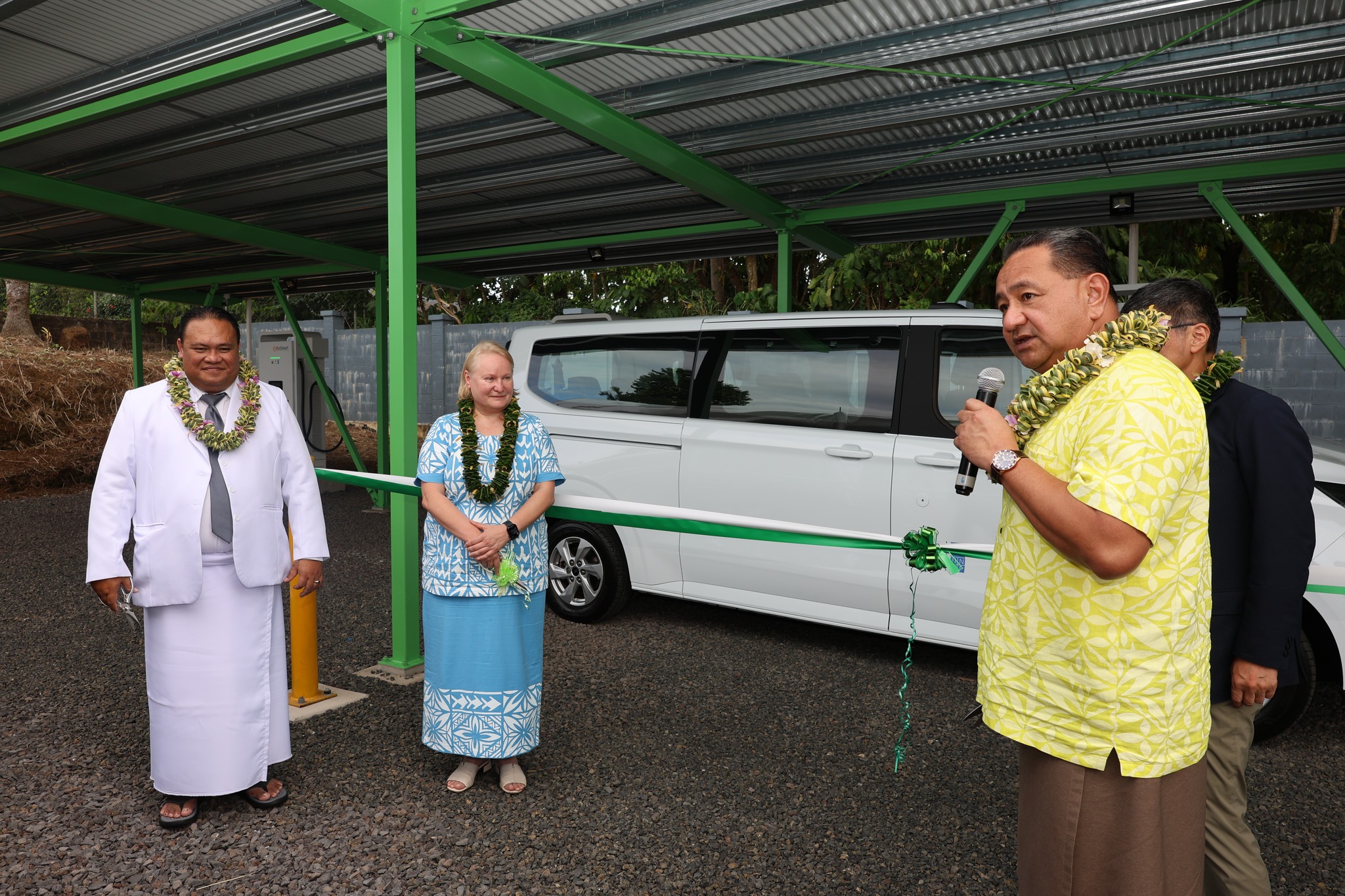
The Government of Samoa yesterday marked a significant step in advancing climate-resilient infrastructure with the official commissioning of the Central Electric Vehicle (EV) Charging Station Hub at Tuanaimato, and the formal handover of 20 Plug-in Hybrid Electric Vehicles (PHEVs) under the Climate Action Pathways for Island Transport (CAP-IT) project.
This milestone supports Samoa’s ongoing efforts to transition its transport sector toward cleaner, low-emission technologies, aligned with the country’s enhanced Nationally Determined Contributions (NDCs) under the Paris Agreement. The CAP-IT project is implemented by the Government of Samoa in partnership with the United Nations Development Programme (UNDP), with funding from the Government of Japan.
The new Central EV Charging Hub, now operational at Tuanaimato, features five 60-kilowatt DC fast chargers, each equipped with dual ports, enabling simultaneous charging of up to ten vehicles, as well as two 22-kilowatt AC chargers. A dedicated 1,000 kVA transformer has been installed on-site to ensure grid stability and uninterrupted charging operations.
The 20 PHEVs are part of a larger fleet of 76-vehicles planned under the CAP-IT initiative. These will be allocated to various government ministries to enhance public service delivery while reducing both fuel consumption and emissions.
The launch event was attended by the Honourable Lautimuia Afoa Uelese Vaai, Minister of Finance; His Excellency Mr. Ryotaro Suzuki, Ambassador of Japan to Samoa; and Her Excellency Ms. Aliona Niculita, UNDP Resident Representative, highlighting the strong collaboration between the Government of Samoa and its development partners in supporting national climate priorities.
In his official remarks, Minister Lautimuia stated:
“𝑇ℎ𝑖𝑠 𝑖𝑠 𝑗𝑢𝑠𝑡 𝑡ℎ𝑒 𝑏𝑒𝑔𝑖𝑛𝑛𝑖𝑛𝑔. 𝑆𝑎𝑚𝑜𝑎’𝑠 𝑡𝑟𝑎𝑛𝑠𝑝𝑜𝑟𝑡 𝑠𝑒𝑐𝑡𝑜𝑟 𝑖𝑠 𝑛𝑜𝑤 𝑒𝑛𝑡𝑒𝑟𝑖𝑛𝑔 𝑎 𝑛𝑒𝑤 𝑝ℎ𝑎𝑠𝑒 𝑤ℎ𝑒𝑟𝑒 𝑐𝑙𝑒𝑎𝑛 𝑡𝑒𝑐ℎ𝑛𝑜𝑙𝑜𝑔𝑦, 𝑠𝑢𝑠𝑡𝑎𝑖𝑛𝑎𝑏𝑙𝑒 𝑝𝑙𝑎𝑛𝑛𝑖𝑛𝑔, 𝑎𝑛𝑑 𝑖𝑛𝑠𝑡𝑖𝑡𝑢𝑡𝑖𝑜𝑛𝑎𝑙 𝑟𝑒𝑎𝑑𝑖𝑛𝑒𝑠𝑠 𝑐𝑜𝑚𝑒 𝑡𝑜𝑔𝑒𝑡ℎ𝑒𝑟 𝑡𝑜 𝑠𝑒𝑟𝑣𝑒 𝑛𝑎𝑡𝑖𝑜𝑛𝑎𝑙 𝑑𝑒𝑣𝑒𝑙𝑜𝑝𝑚𝑒𝑛𝑡.”
The Ministry of Finance, as custodian of the EV Charging Hub, has committed to ensuring its optimal operation and long-term maintenance. The launch marks not only a technological advancement, but also a reaffirmation of Samoa’s direction towards energy security and environmental sustainability.
Beyond land transport, the CAP-IT project is also supporting the maritime sector with the development of five electric alia (e-Alia) vessels, which are expected to undergo sea trials soon. This integrated approach demonstrates Samoa’s commitment to a comprehensive low-carbon transport transformation.
The Government of Samoa acknowledges with appreciation the ongoing support of UNDP and the Government of Japan in enabling this national transition to sustainable transport solutions.